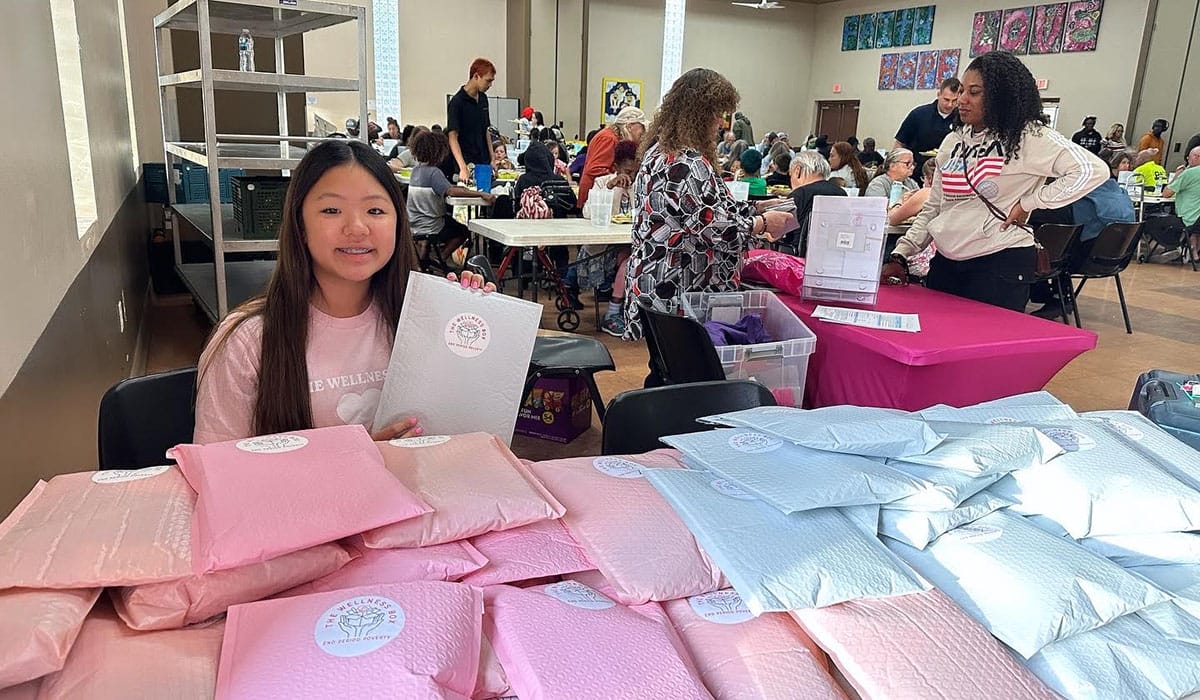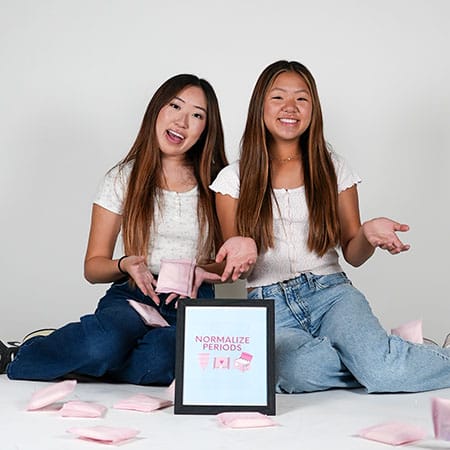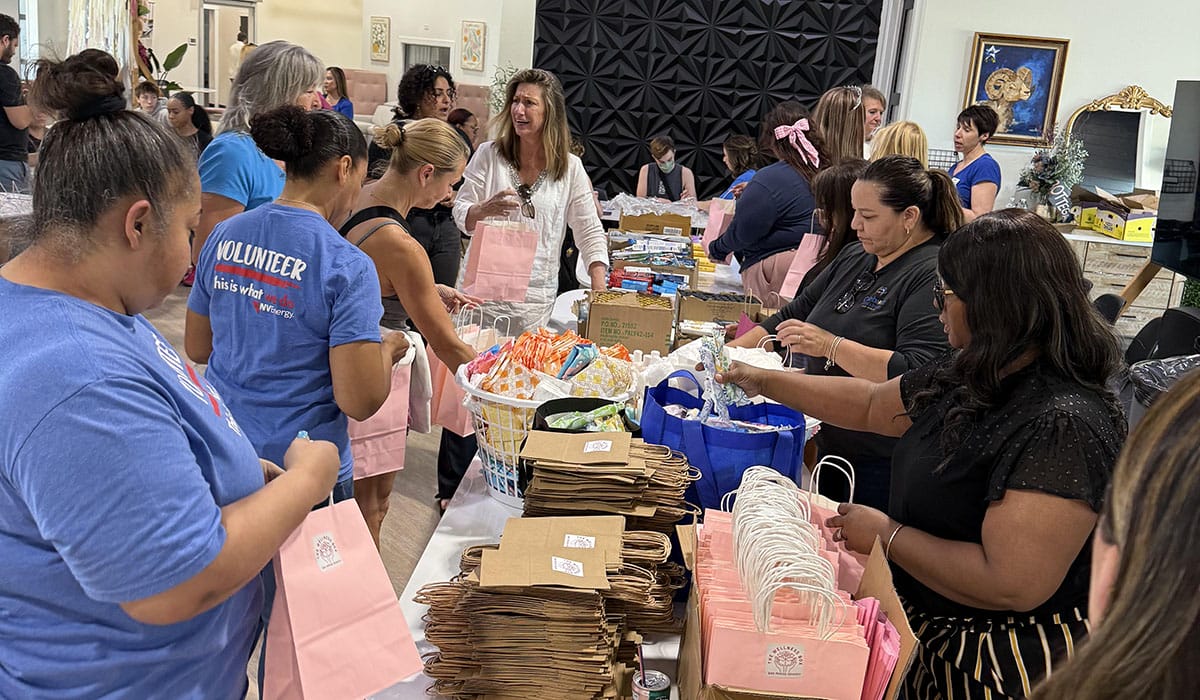On a Mission to Dismantle Stigma and End Period Poverty

Meet Daily Point of Light Award honoree Chloe Kim. Read her story, and nominate an outstanding volunteer or family as a Daily Point of Light.
Half of the population of the world has had or will have a period, so why is it still so hard for many to talk about? And what happens when people can’t afford or access period and hygiene products? Two years ago, 16-year-old Chloe Kim started The Wellness Box Foundation with her older sister, Caitlyn, to tackle issues surrounding period poverty and ending the stigma surrounding the topic.
In her menstrual health workshop, she teaches elementary school students about the bodily function and provides a safe place for discussion, effectively breaking down the social taboo. Her call for donations has resulted in the packing and distribution of over 15,000 product-filled wellness boxes to shelters, schools, anti-trafficking organizations and unhoused individuals. Through fundraising, she’s raised over $35,000.
Today, the organization has chapters in five U.S. states and Switzerland. Chloe’s school club has over 50 volunteers helping with packing parties and the Las Vegas Chapter, over 500. As she turns her attention towards college applications, Chloe remains excited to start one wherever she attends. And who knows? Perhaps the youngest Kim sister will one day take over the original.

What inspired you to get started with this initiative?
The Wellness Box Foundation was pretty much my first time volunteering. As my sister and I were starting to learn what it was like to be a teenager, we realized that there was an issue with period poverty in our community, which is when there’s a lack of access to menstrual products and menstrual education. And it’s something that not many people tend to address.
One in five teens are unable to afford products, and many have to miss class during their cycles. Many women have to miss work. They resort to using socks instead of proper period products. The more I learned, the more I felt the need to do something about it.
What should people know about period poverty?
It’s a huge issue in our community. And it’s okay to talk about periods; it’s not something to be embarrassed about. Most women live with menstrual cycles, but the stigma is still there.
I also want people my age to know that you’re never too young to make an impact. When the community comes together on an issue, it can make a big impact. Even a little help goes a long way. And from what I’ve learned, people love to help out.
Tell us about your volunteer role with The Wellness Box Foundation.
At first, there were a lot of calls to local shelters to see what the need was. Now that we’re more familiar, many accept drop offs. At this point, much of our work is organizing packing parties. We partner with various student-run organizations, nonprofits and small businesses. Volunteers put together wellness bags with period and hygiene products that provide women with dignity and self-confidence. Most of our products come through supply drives, but when we host parties, a lot of the volunteers bring some to add.
We’re usually able to make a couple hundred kits. Sometimes I just do drop offs, and other times, we stay for hours to hand them out and hear people’s stories. I’ve recently been focusing on distributing boxes to nonprofits supporting survivors of human trafficking. Nevada ranks number two in the country for human traffic incidents. Not many people know that.
We also go to schools and educate young students about their first period. Many of the girls tend to laugh. But when you tell them it’s normal, they start to take it seriously. A lot of them don’t know what it’s like and don’t have people to educate them about what’s going to happen. They’re extremely curious and love to ask questions. Someone once asked if her autism would affect her period. It’s great that I get to be the one to teach them and ensure they feel prepared.
You’ve been working with state legislators. What are some of the changes you would like to see?
I’ve worked to advocate for an end to taxes on tampons and supplying free products in public school restrooms. At one point, I went to the legislature in Carson City and got to experience the democratic process firsthand. I watched people figure out issues and talk about what needs to be done and how.

What’s been the most rewarding part of your work?
One of my favorite things is when we actually get to hand out the bags to young girls and women. It always puts a smile on their face when they know that they’re going to be okay for the week with products to help. Little girls get excited about the gift. It’s heartwarming.
What have you learned through your experiences as a volunteer?
If you just sit back and watch things happen, the problem is not going to magically fix itself. You need to take the initiative to organize packing parties, get the community out and talk about periods. Even in high school, many people don’t feel comfortable talking about them. It’s important to influence your peers, to recognize that it’s okay to talk about and help with. Get the community involved.
Why is it important for others to get involved with causes they care about?
No matter what you’re doing, if you’re helping the community, it’s going to make you feel good about yourself. The first time I distributed wellness bags, I felt good for the rest of the day. That’s what kept pushing me to keep expanding and do what I was doing.
What do you want people to learn from your story?
It’s important to use your time to do something great. It’s important to make an impact, because there are so many different groups of people that need help. Period poverty is just one of the many issues in our community, and the more people who hear about us and reach out to help, the more I’m inspired. I hope others are, too.
Do you want to make a difference in your community like Chloe? Find local volunteer opportunities